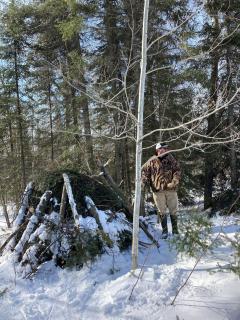Partnership teaches community members to reduce wildfire risks
MINNESOTA—Gathered around piles of cut and stacked balsam fir, 25 members from communities surrounding the Superior National Forest participated in a pile burning workshop. With plenty of snow still on the ground, forest staff and Dovetail Partners offered the workshop to help landowners learn how to increase wildfire resiliency around their homes and properties.
Dovetail Partners’ Gloria Erickson described why their group partnered with the USDA Forest Service for the workshop. “Wildfire resiliency, across multiple land ownerships, is crucial to protect people and help restore the ecosystem we live in. We all have a role to play. Private landowners are working hard to be more wildfire resilient by removing the hazardous woody debris from their properties. They need multiple, economical ways to dispose of that debris. Teaching how to safely pile burn is one of those options,” Erickson said.
Superior fire staff instructed the group on basic wildfire behavior and how to remove and safely pile burn hazardous woody debris. Discussions covered general fire behavior, what hazardous fuels are and how they can increase fire behavior, and how to use Firewise USA practices to increase wildfire resiliency.
Workshop participants ranged in age and asked great questions. “We were really happy how engaged people were and how many attended despite the chilly weather,” said Nicole Selmer, fire prevention technician, Superior National Forest. “As federal land managers and firefighters, we know that increased hazardous fuels on the landscape can increase risks in the event of a wildfire; however, it is important for us to educate landowners. Dead ladder fuels like balsam fir, when ignited by a wildfire, can push the fire into the crown of the trees, increasing fire intensity. Working and educating people across boundary ownerships, such as this workshop did, helps reduce hazardous fuels landscape-wide. It is important for everyone who lives in a forest community to understand this and educate themselves.”
“Conducting workshops like these helps to empower people to work together (across land ownership boundaries) to take care of the land and to be more resilient to wildfire. Private landowners need to be recognized for what they are doing, and we need to continue to provide them with the tools to do that,” added Erickson.


